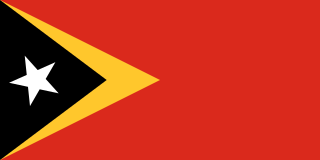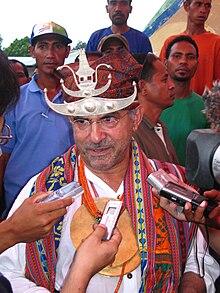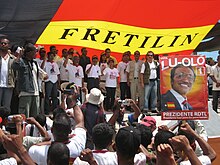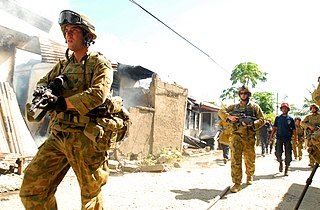
The Revolutionary Front for an Independent East Timor is a leftist political party in East Timor. They presently hold 23 of 65 seats in the National Parliament and serve in the opposition. Fretilin formed the government in East Timor from independence until 2007. The party began as a resistance movement that fought for the independence of East Timor, first from Portugal and then from Indonesia, between 1974 and 1998. After East Timor gained its independence from Indonesia, Fretilin became one of several parties competing for power in a multi-party system.

Mari bin Amude Alkatiri, GCIH is a Timorese politician. He was Prime Minister of East Timor from May 2002 until his resignation on 26 June 2006 following weeks of political unrest in the country, and again from September 2017 until May 2018. He is the Secretary-General of the Fretilin party, as well as President of the Special Administrative Region of Oecusse.

The 2006 East Timorese crisis began as a conflict between elements of the military of East Timor over discrimination within the military, and expanded to a coup attempt and general violence throughout the country, centred in the capital Dili. The crisis prompted a military intervention by several other countries and led to the resignation of the Prime Minister Mari Alkatiri.

José Maria VasconcelosGColIH, popularly known by his nom de guerreTaur Matan Ruak is an East Timorese politician who has served as the Prime Minister of East Timor since 22 June 2018. He was also President of East Timor from 20 May 2012 to 20 May 2017. Before entering politics, he was the Commander of the FALINTIL-Forças de Defesa de Timor-Leste (F-FDTL), the military of East Timor, from 2002 until 6 October 2011. Prior to serving in the F-FDTL, he was the last commander of the Armed Forces of National Liberation of East Timor or FALINTIL, the insurgent army which resisted the Indonesian occupation of the territory from 1975 to 1999.

A parliamentary election was held in East Timor on 30 June 2007. Although a narrow plurality was achieved by the Revolutionary Front for an Independent East Timor (FRETILIN), a coalition involving the next three largest groups formed a government. New Prime Minister Xanana Gusmão of the National Congress for Timorese Reconstruction (CNRT) was sworn in on 8 August 2007; Fernando de Araújo of the Democratic Party became President of the National Parliament.
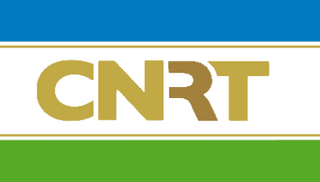
The National Congress for Timorese Reconstruction is a political party in East Timor founded by former President Xanana Gusmão in March 2007 in preparation for the 2007 parliamentary election.

Francisco Guterres, popularly known as Lú-Olo, is an East Timorese politician who has been President of East Timor since 2017. He is also the President of Fretilin, and he was President of the National Parliament of East Timor from 2002 to 2007. As the Fretilin candidate, he stood in the 2007 presidential election and 2012 presidential election, but was defeated in the second round by independent candidates on both occasions. He also contested the 2017 presidential election, and with the support of former Prime Minister Xanana Gusmão and his party, National Congress for Timorese Reconstruction (CNRT), he was elected as President.

Fernando de Araújo, also known as Lasama was an East Timorese politician who was President of the National Parliament of East Timor from 2007 to 2012. He also served as the Acting President for two months in early 2008. He was also the President of the Democratic Party.

José Luís Guterres is an East Timorese politician and diplomat.
Rogerio Tiago Lobato is an East Timorese politician and former Interior Minister belonging to Fretilin. He was a founding member of the first independent government of East Timor, in 1975, led by Fretilin. He is also the brother of the late Nicolau Lobato, second President of the country who was killed in action after the Indonesian invasion, in late 1978.

Rebel East Timorese soldiers invaded the homes of the President and Prime Minister of East Timor on 11 February 2008, leading to the shooting and serious wounding of President José Ramos-Horta, the shooting up of the car of Prime Minister Xanana Gusmão, and the fatal shooting of rebel leader Alfredo Reinado. The attacks have been variously interpreted as attempted assassinations, attempted kidnappings and an attempted coup d'état. The rebels' intentions remain unknown.
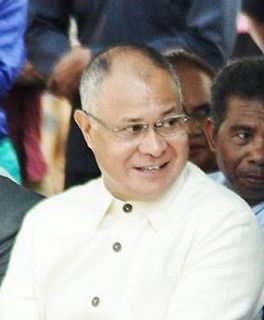
Vicente da Silva Guterres is a politician from East Timor, a member of the National Parliament of East Timor and its Vice-President since 2007.

A presidential election was held in Timor-Leste on 17 March and 16 April 2012 to choose a president for a five-year term. Incumbent president Jose Ramos-Horta, who was eligible for a second and final term as president, announced that he would seek nomination to be a candidate in the election. The election was seen as a test for the "young democracy" in seeking to take control of its own security. Former military commander Taur Matan Ruak provisionally beat Francisco Guterres in a second round runoff.

Frente de Reconstrução Nacional de Timor-Leste - Mudança, commonly known as Frenti-Mudança, is a political party in East Timor led by Vice-Prime minister José Luís Guterres.
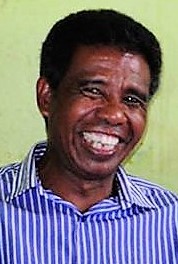
Presidential elections were held in East Timor on 20 March 2017. Incumbent President Taur Matan Ruak, who was eligible for a second term, chose not to run for re-election. The result was a victory for Francisco Guterres of FRETILIN.

